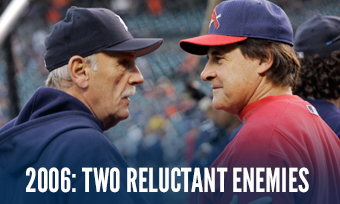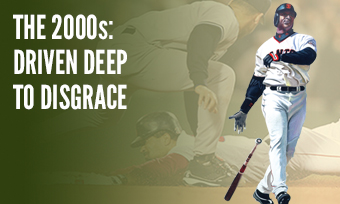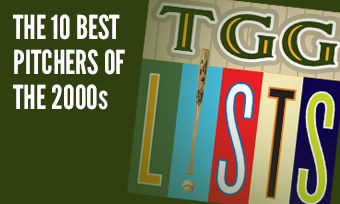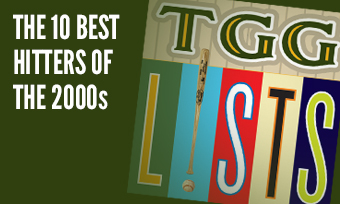The Yearly Reader
Leaders and Honors, 2006
Our list of baseball’s top 10 hitters and pitchers in both the American League and National League for the 2006 baseball season, as well as the awards and honors given to the game’s top achievers of the year.
The National League’s Top 10 Hitters, 2006
Bold type in brick red indicates league leader.
1. Albert Pujols, St. Louis
Key Numbers: .331 average, 119 runs, 177 hits, 33 doubles, 49 home runs, 137 RBIs, 92 walks, 28 intentional walks, 20 grounded into double plays, .671 slugging percentage.
Part of Pujols’ nonstop demolition included an all-time-record 14 home runs in April; six months later, he was publicly upset that he finished runner-up to Ryan Howard for NL MVP honors, saying the award should have gone to someone whose team made the playoffs (like his).
2. Ryan Howard, Philadelphia
Key Numbers: .313 average, 104 runs, 182 hits, 25 doubles, 58 home runs, 149 RBIs, 108 walks, 37 intentional walks, 181 strikeouts.
Considered the first “clean” challenger to Roger Maris’ 61 homers, Howard was an MVP earning near-minimum baseball wages.
3. Lance Berkman, Houston
Key Numbers: .315 average, 95 runs, 29 doubles, 45 home runs, 136 RBIs, 98 walks, 22 intentional walks.
Don’t blame Berkman for the Astros’ failure to overtake the Cardinals in the NL Central standings; he hit .377 with four homers and 19 RBIs over 61 at-bats against St. Louis. Without him, Houston’s major league-worst .255 team batting average dropped to .248.
4. Miguel Cabrera, Florida
Key Numbers: .339 average, 112 runs, 195 hits, 50 doubles, 26 home runs, 114 RBIs, 86 walks, 27 intentional walks, 10 hit-by-pitches.
The Future Hall of Famer with four batting titles in him nearly secured a fifth in advance, trailing only Freddy Sanchez by five points in the NL race.
5. Carlos Beltran, New York
Key Numbers: .275 average, 127 runs, 38 doubles, 41 home runs, 116 RBIs, 95 walks, 18 stolen bases.
By a nose and maybe more, Beltran was the better of the two Carlos (the other being Carlos Delgado) making their Shea Stadium debuts; Beltran never knocked in more runs, scored more runs, walked more nor hit more homers.
6. Matt Holliday, Colorado
Key Numbers: .326 average, 119 runs, 196 hits, 45 doubles, 5 triples, 34 home runs, 114 RBIs, 15 hit-by-pitches, 10 stolen bases, 22 grounded into double plays.
Representing a new wave of Blake Street Bombers in Denver, the third-year Holliday hit fruition by, of course, saving his best numbers for home (.373 average and 22 home runs at Coors Field).
7. Garrett Atkins, Colorado
Key Numbers: .329 average, 117 runs, 198 hits, 48 doubles, 29 home runs, 120 RBIs, 24 grounded into double plays.
Considered Holliday’s equal in terms of promising potential in Colorado, Atkins excelled both at home and on the road at sea level (.313 average away from Coors Field), but his staying power would be nil with a gradual fadeout leading to departure from the majors barely after turning 30.
8. Chase Utley, Philadelphia
Key Numbers: .309 average, 658 at-bats, 131 runs, 203 hits, 40 doubles, 32 home runs, 102 RBIs, 14 hit-by-pitches, 15 stolen bases.
Utley was fueled by a 35-game hitting streak in midseason, just short of the all-time Phillies’ mark set a year earlier by teammate Jimmy Rollins.
9. Alfonso Soriano, Washington
Key Numbers: .277 average, 647 at-bats, 119 runs, 179 hits, 41 doubles, 46 home runs, 95 RBIs, 41 stolen bases.
Soriano, who couldn’t wait to leave last-place Washington, became baseball’s first 40-40-40 (doubles-homers-steals) man in his only year with the Nationals.
10. Barry Bonds, San Francisco
Key Numbers: 130 games, .270 average, 26 home runs, 77 RBIs, 115 walks, 38 intentional walks, 10 hit-by-pitches, .454 on-base percentage.
No longer Super-Synthetic Man as he returned to work after a virtual year off in 2005 from knee injuries, the 42-year-old Bonds was still just dangerous enough to continue earning the respect of opposing pitchers who doled out more free passes to him than any other National Leaguer.
The American League’s Top 10 Hitters, 2006
1. David Ortiz, Boston
Key Numbers: .287 average, 115 runs, 29 doubles, 54 home runs, 137 RBIs, 119 walks, 23 intentional walks.
Never more dangerous, Ortiz set a still-existing record with 47 home runs playing as a designated hitter—breaking his mark of a year earlier.
2. Travis Hafner, Cleveland
Key Numbers: 129 games, .308 average, 100 runs, 31 doubles, 42 home runs, 114 RBIs, 100 walks, .659 slugging percentage.
Pronkville—shorthand for the right-field bleachers at Jacobs Field—was never more abuzz as Hafner sent one ball after another its way; who knows how many more homers he would have hit had a broken hand not cut his season short by a month.
3. Jermaine Dye, Chicago
Key Numbers: .315 average, 103 runs, 170 hits, 27 doubles, 44 home runs, 120 RBIs.
Everyone was talking up Paul Konerko and Jim Thome as the prime White Sox sluggers as 2006 began, but Dye obviously got lost in the discussion.
4. Justin Morneau, Minnesota
Key Numbers: .321 average, 97 runs, 190 hits, 37 doubles, 34 home runs, 130 RBIs, 11 sacrifice flies.
Getting benched in June with a .236 average—after hitting .239 in 2005—scared Morneau straight into a booming second half, pulling an AL MVP upset over favorite Derek Jeter.
5. Jim Thome, Chicago
Key Numbers: .288 average, 108 runs, 26 doubles, 42 home runs, 109 RBIs, 107 walks.
Back in the AL and replacing long-time White Sox icon Frank Thomas (now with Oakland) at the DH spot, Thome surpassed the 40-home threshold for the sixth and last time in his Hall-of-Fame career.
6. Derek Jeter, New York
Key Numbers: .343 average, 118 runs, 214 hits, 39 doubles, 14 home runs, 97 RBIs, 12 hit-by-pitches, 34 stolen bases.
A year of ‘almosts’ for the Yankees legend; he finished second to Joe Mauer in the batting race by four points, and was a close runner-up for the MVP (taken by another Twin, Justin Morneau).
7. Grady Sizemore, Cleveland
Key Numbers: 162 games, .290 average, 655 at-bats, 134 runs, 190 hits, 53 doubles, 11 triples, 28 home runs, 76 RBIs, 13 hit-by-pitches, 22 stolen bases.
Emerging fast at age 24, Sizemore became only the second player (Chuck Klein, 1932) to collect at least 50 doubles, 10 triples, 25 homers and 20 steals in one year.
8. Alex Rodriguez, New York
Key Numbers: .290 average, 113 runs, 26 doubles, 35 home runs, 121 RBIs, 90 walks, 15 stolen bases, 22 grounded into double plays.
A strong finish usurped a midsummer slump so terrible that Sports Illustrated ran a cover story on his struggles to hit, field and appreciate any advice from coaches and teammates.
9. Jason Giambi, New York
Key Numbers: 139 games, .253 average, 92 runs, 25 doubles, 37 home runs, 113 RBIs, 110 walks, 16 hit-by-pitches.
Though all but resigned to batting in the mid-.250s after a star stretch of .300-plus play in the early 2000s, Giambi still was awfully good at ripping the ball over the fence.
10. Manny Ramirez, Boston
Key Numbers: 130 games, .321 average, 79 runs, 27 doubles, 35 home runs, 102 RBIs, 100 walks, .439 on-base percentage.
In a classic case of one’s reputation preceding itself, Ramirez sat out an accumulated three weeks complaining of a tender knee—but others within the Red Sox universe suspected (again) that he was quitting on the team.
The National League’s Top 10 Pitchers, 2006
1. Brandon Webb, Arizona
Key Numbers: 3.10 ERA, 16 wins, 8 losses, 33 starts, 3 shutouts, 235 innings, 50 walks, 24 stolen bases allowed, 29 grounded into double plays.
An improved sinker and better fielding behind him made Webb—two years earlier the league leader in walks—much stingier to earn a free pass off of.
2. Chris Carpenter, St. Louis
Key Numbers: 3.09 ERA, 15 wins, 8 losses, 32 starts, 3 shutouts, 221.2 innings, 43 walks, 10 hit-by-pitches.
Another argument for Tommy John surgery: Carpenter, a NL Cy Young recipient two years after missing an entire season from the procedure.
3. Roy Oswalt, Houston
Key Numbers: 2.98 ERA, 15 wins, 8 losses, 32 starts, 220.1 innings, 38 walks, 23 grounded into double plays.
Oswalt helped himself at the plate with 20 sacrifice bunts to lead all of baseball; his ERA was the highest by a NL leader in 45 years.
4. Derek Lowe, Los Angeles
Key Numbers: 3.63 ERA, 16 wins, 8 losses, 34 starts, 218 innings, 26 stolen bases allowed, 29 grounded into double plays.
One of six pitchers to co-lead the NL with 16 wins—the lowest number ever to pace the circuit in a non-shortened season—Lowe enjoyed his best of four solid (if not dominant) seasons with the Dodgers.
5. Billy Wagner, New York
Key Numbers: 2.24 ERA, 3 wins, 2 losses, 40 saves, 5 blown saves, 70 appearances, 72.1 innings.
One of numerous big-name acquisitions by a Mets team embracing a “win-now” philosophy, Wagner delivered in the regular season—but crashed in the playoffs to follow, an extension of a misery-laden (10.03 ERA in 14 appearances) postseason career.
6. John Smoltz, Atlanta
Key Numbers: 3.46 ERA, 16 wins, 9 losses, 35 starts, 232 innings, 20 grounded into double plays.
Showing that the grind of a 162-game season wasn’t taxing the 39-year old, Smoltz won 12 of his 16 games after the turn to the second half.
7. Takashi Saito, Los Angeles
Key Numbers: 2.07 ERA, 6 wins, 2 losses, 24 saves, 2 blown saves, 72 appearances, 78.1 innings.
Starting the year in Triple-A, the 36-year-old rookie from Japan ultimately replaced the closer who replaced Eric Gagne (out for the year) and pleasantly surprised Dodgers brass and teammates.
8. Bronson Arroyo, Cincinnati
Key Numbers: 3.29 ERA, 14 wins, 11 losses, 35 starts, 240.2 innings.
With a straight-leg kick that made him appear as if he was imitating one of John Cleese’s silly walks, Arroyo clearly proved that the Reds got the better of a straight-up trade with the Red Sox for Wily Mo Pena.
9. Carlos Zambrano, Chicago
Key Numbers: 3.41 ERA, 16 wins, 7 losses, .696 win percentage, 33 starts, 214 innings, 115 walks.
Zambrano’s pitching brilliance, occasional on-mound theatrics and impressive hitting—he belted six home runs—provided precious few bright spots in an otherwise forgettable year for the Cubs.
10. Clay Hensley, San Diego
Key Numbers: 3.71 ERA, 11 wins, 12 losses, 1 blown save, 37 appearances, 29 starts, 187 innings, 27 grounded into double plays.
The relative no-namer on a somewhat star-laden Padres rotation that included Jake Peavy and Chan Ho Park, Hensley held his own in his only full-time year as starter amid seven major league campaigns.
The American League’s Top 10 Pitchers, 2006
1. Johan Santana, Minnesota
Key Numbers: 2.77 ERA, 19 wins, 6 losses, .760 win percentage, 34 starts, 233.2 innings, 47 walks, 245 strikeouts.
At the height of his game and fame, Santana became the first Twins/Senators pitcher since Walter Johnson to win the pitcher’s triple crown (leading the league in wins, ERA and strikeouts).
2. Chien-Ming Wang, New York
Key Numbers: 3.63 ERA, 19 wins, 6 losses, 1 save, 33 starts, 218 innings, 33 grounded into double plays.
Along with the Dodgers’ Takashi Saito, the Taiwan-born Wang continued to prove that Far East players could easily hold their own in the majors.
3. Joe Nathan, Minnesota
Key Numbers: 1.58 ERA, 7 wins, 0 losses, 36 saves, 2 blown saves, 64 appearances, 68.1 innings.
Johan Santana and rookie phenom Francisco Liriano got all the attention on the Twins’ mound, but it was Joe Nathan who closed out opponents with little fanfare—and little failure.
4. Roy Halladay, Toronto
Key Numbers: 3.19 ERA, 16 wins, 5 losses, .762 win percentage, 32 starts, 220 innings, 34 walks, 20 stolen bases allowed, 23 grounded into double plays.
Getting runners on base against Halladay only made him mad; opponents hit .213 with only a pair of homers in 178 at-bats with runners in scoring position against the Blue Jays’ ace.
5. Francisco Rodriguez, Los Angeles of Anaheim
Key Numbers: 1.73 ERA, 2 wins, 3 losses, 47 saves, 4 blown saves, 69 appearances, 73 innings, 10 wild pitches.
After giving up back-to-back-home runs when thrown into a 14-0 game on June 4, Rodriguez’s ERA was 0.55 over his remaining 48.2 innings—a stretch that included a career-high streak of 31.2 straight shutout innings.
6. C.C. Sabathia, Cleveland
Key Numbers: 3.22 ERA, 12 wins, 11 losses, 28 starts, 6 complete games, 2 shutouts, 192.2 innings.
The great, king-sized (6’7”, at least 260 pounds) pitching hope in Cleveland had been delivering the wins through his first five years, but he finally tempered down his ERA to a superior level despite a blasé record.
7. B.J. Ryan, Toronto
Key Numbers: 1.37 ERA, 2 wins, 2 losses, 38 saves, 4 blown saves, 65 appearances, 72.1 innings, 8 grounded into double plays.
Signing the largest contract (five years, $47 million) given to a closer at the time, Ryan rewarded the Jays back with sterling ninth-inning duties. It would easily be his best (and pain-free) output of his otherwise ill-fated Toronto tenure.
8. Mike Mussina, New York
Key Numbers: 3.51 ERA, 15 wins, 7 losses, .682 win percentage, 32 starts, 197.1 innings, 35 walks.
Mussina became the first AL pitcher to notch at least 10 wins in each of 15 straight seasons—but his eternal search for that one 20-victory campaign continued to elude him, winning just two of his final nine starts.
9. J.J. Putz, Seattle
Key Numbers: 2.30 ERA, 4 wins, 1 loss, 36 saves, 7 blown saves, 72 appearances, 78.1 innings, 13 walks.
Continuing the trend of initialed pitchers on this list, the intimidating, goatee-chiseled closer began a short but impressive reign as stopper in Seattle. (BTW: It’s pronounced “puts,” now “putts.”)
10. Erik Bedard, Baltimore
Key Numbers: 3.76 ERA, 15 wins, 11 losses, 33 starts, 196.1 innings.
An unlikely saving grace for an otherwise putrid Orioles pitching staff, the southpaw from north of the border rose to respectable heights after posting a 12-18 record and 4.31 ERA over his first two-plus years.









